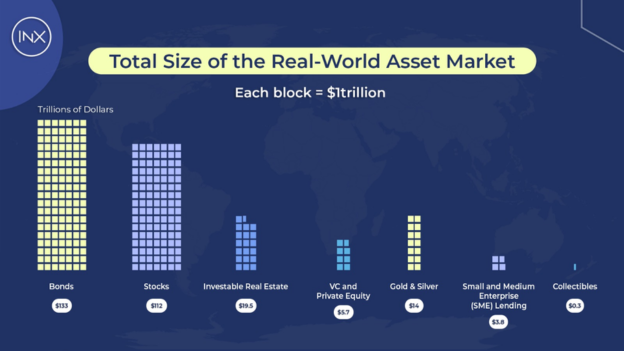Six Megatrends That Will Define Digital Assets In 2024

2024 will mark 15 years since Satoshi’s whitepaper ushered in the digital assets era, and what a ride it has been. What was initially launched as an experiment on the fringes of the internet has evolved into a bona fide asset class attracting the attention, and capital, of the best investors in the world. Like any precarious teenager entering its 16th year, the digital assets industry is expected to make massive strides toward maturity in the upcoming year. As we leave behind the struggles of the crypto winter and look forward to 2024, several macro shifts are poised to reshape the industry, cementing the transformative power of blockchain and digital assets.
Here, we've distilled the upcoming changes into six megatrends that will define the next year:
Compliant Assets Win As The Regulatory Picture Becomes Clearer Worldwide
As 2024 approaches, the regulatory landscape for digital assets is solidifying, particularly with the SEC's unyielding stance in a U.S. election year. The shadow of 2023's bad actors has cast apprehension among investors, pushing them towards safer, regulated avenues. Globally, regulatory efforts like the European Union's MiCa framework and Korea's proactive guidelines are steering the narrative towards legitimacy. Consequently, security tokens, backed by real assets and aligned with international regulatory frameworks, are emerging as the new gold standard. This shift marks a transition from speculative gambles to an era characterized by structured growth, compliance, and robust investor protection.
Institutional Embrace: From Bitcoin To ETFs And Beyond
The anticipated green light for Bitcoin ETFs signals a tectonic shift in the financial landscape. Gatekeepers of significant capital, institutional investors are now zeroing in on Bitcoin and other regulated security tokens. This focus is not just about larger entities diving into the digital asset pool, but about paving a path for mainstream investors to join the fray. As a result, while established and regulated digital assets gain traction, many altcoins risk being sidelined. It is accepted that other ETFs will be approved not only on BTC but possibly on a basket of cryptos which will drive significant demand to the underlying assets. It is a natural evolution of digital economy and it will not be a surprise to see a digital ETF registered security token, as well as other tokenized assets like stocks, bonds, gold, and so on, trading 24/7. The overarching theme? A maturing market that prizes legitimacy and structured investment over fleeting trends.
Real-World Assets Meet DeFi: A Multi-Trillion Dollar Opportunity
An immense reservoir of real-world assets, totalling to a staggering $280 trillion, is on the cusp of entering the DeFi realm. As stocks, bonds, real estate, and other tangible assets get tokenized, they are poised to become integral components of DeFi platforms. The integration of these real-world assets into decentralized finance will blur the lines between traditional and decentralized finance, offering unprecedented liquidity and opportunities.


Industry Consolidation: Bracing For The Next Bull Wave
In the preceding 18 months, the digital asset space bore witness to a disconcerting number of failures. From outright scams crashing spectacularly to ill-equipped companies depleting their reserves, the industry underwent a stringent test of resilience. Coupled with a frosty VC and IPO climate, this phase has set the stage for a heightened M&A activity. As the pendulum swings towards a looming bull market, surviving entities are strategizing to join forces. This consolidation wave is more than just mergers; it signifies the digital assets industry's inevitable march towards maturity, robustness, and long-term sustainability.
AI & Blockchain: Decentralizing Intelligence, Ensuring Authenticity
Artificial Intelligence, with its myriad applications and undeniable potential, is not without pitfalls. A significant concern lies in the realm of AI remaining closed-source, a trajectory that can limit innovation and concentrate power. However, blockchain offers a promising antidote. By decentralizing AI data and decision-making processes, blockchain introduces transparency to what has traditionally been a black box. More than just opening up AI, the immutability and traceability of blockchain can be weaponized against one of the most menacing challenges of our digital age: deep fakes. Through blockchain's digital signatures, we can verify the authenticity of content, ensuring that what we see and hear can be trusted in an age of digital mirages.
The Acceleration Of CBDC Initiatives
Central Bank Digital Currencies (CBDCs) are moving from experimental undertakings to serious government projects. The promise of CBDCs are already being transformed into practice. In fact, A 2023 white paper from the World Economic Forum states, “The exploration of central bank digital currency (CBDC) has gained significant momentum, with over 100 countries, representing more than 95% of global gross domestic product (GDP), actively engaging in research, development, pilots or fully-launched CBDC initiatives. This exponential increase in exploration highlights the growing recognition of CBDCs as a transformative tool in the future of digital payments.”
In 2024, the pace of CBDC development will skyrocket. As nations recognize the benefits of digital currencies — from increased transaction efficiency to bolstered monetary sovereignty — they'll pour resources into making CBDCs a reality. This shift signifies not just the digitization of money but a rethinking of global financial infrastructures.
In essence, 2024 will be more than just another year for the digital asset industry. It'll be a seminal period of consolidation, growth, and profound evolution. The megatrends highlighted above are but harbingers of the transformative changes on the horizon. As these trends unfold, they'll not only redefine the digital asset space but also leave an indelible mark on the global financial landscape.




